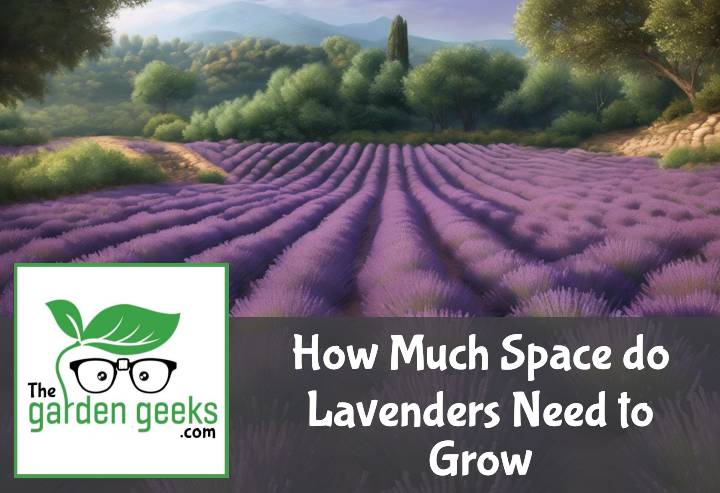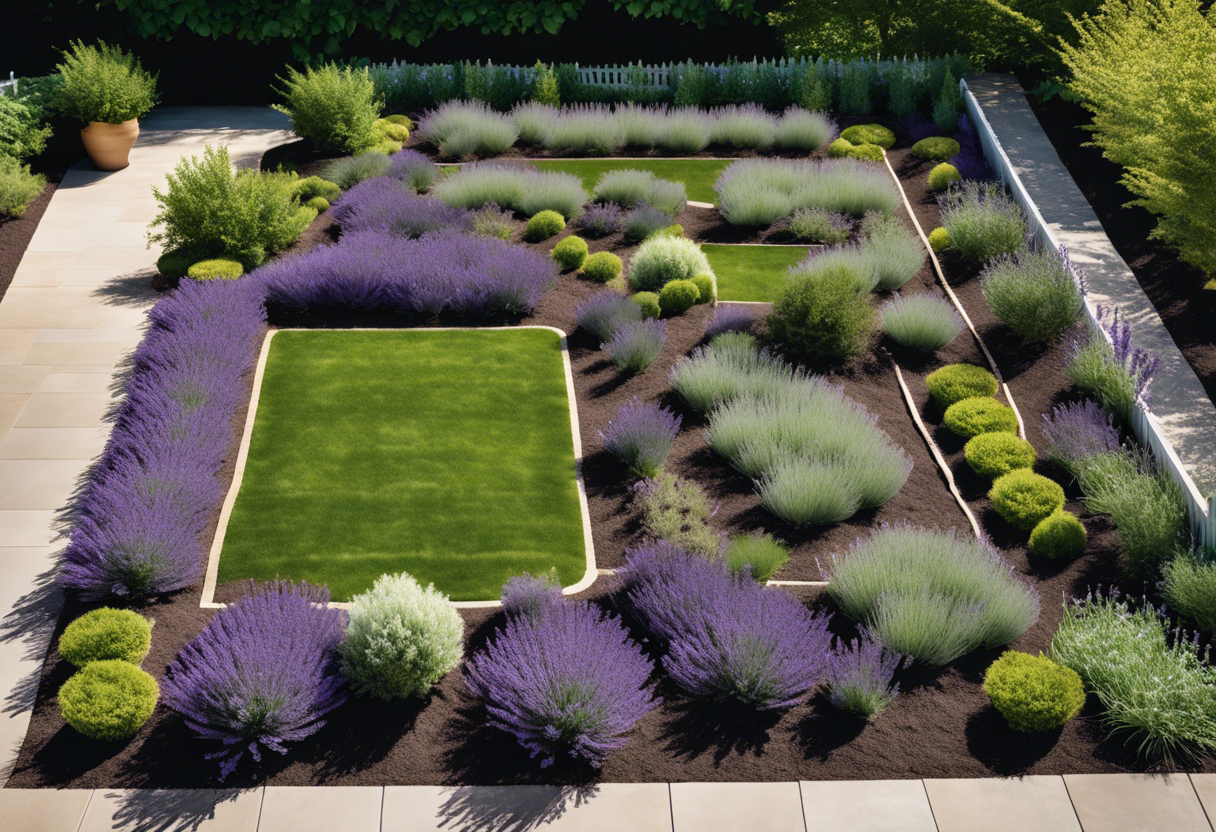Ever tried squeezing into a pair of jeans that just doesn’t fit anymore? Yeah, it’s not fun. Well, plants feel the same way about their growing space! Especially when we’re talking about lavenders. You see, getting the right Space for Lavenders to Grow is like finding the perfect pair of jeans – it needs to be just right!
But don’t worry, you won’t need a tape measure or a green thumb to figure this out. We’ve got all the deets covered in this blog post. So sit back, grab a cuppa and keep reading about ‘How Much Space do Lavenders Need to Grow?’
Key Takeaways
- Lavenders need sufficient space to grow, typically between 1 to 3 feet apart.
- The exact spacing depends on the lavender variety; larger varieties require more space.
- Proper spacing ensures good air circulation, reducing disease risk.
- Overcrowding can lead to poor growth and lower flower production.
- In pots, lavenders should have at least a 12 to 16-inch diameter space.
Understanding Lavender Plants
Lavender plants, oh boy! They’re a sight to behold and a treat for the senses. With their vibrant purple flowers and intoxicating scent, they’re a favorite among gardeners worldwide. But understanding lavender growth is key to keeping these beauties thriving.
The Basics of Lavender Growth
When it comes to basic care for lavenders, there are a few things you gotta keep in mind. First off, these sun-loving plants need at least six hours of sunlight each day. So, make sure you pick a bright spot for them in your garden.
Next up is soil type. Lavenders prefer well-draining soil with a pH between 6 and 8. Too much moisture can lead to root rot, so sandy or gravelly soil works best.
Watering? Well, lavenders are pretty drought-tolerant once established. Water them deeply but infrequently, allowing the soil to dry out between waterings.
Types of Lavender and Their Space Requirements
Now let’s talk about different types of lavenders and the space needed for lavender plants. English lavender (Lavandula angustifolia), for instance, typically grows in a compact bush that reaches about 1 to 3 feet in height and spread.
On the other hand, French lavender (Lavandula stoechas) tends to be larger and bushier, requiring more space – up to 3 feet apart from other plants!
So when planning your garden layout, consider the specific space requirements for different lavenders. It’s all about giving your plants room to breathe while maximizing your garden’s potential. Remember folks – happy lavenders mean a happy gardener!
How Much Space do Individual Lavender Plants Need?
When it comes to space for lavenders to grow, there’s more than meets the eye. It’s not just about the surface area, folks! We’re talking root systems and above-ground growth. These factors play a big role in your lavender plant’s health and productivity.
Root System of Lavenders
Let’s start underground with the lavender root system. These roots are like the secret agents of the plant world, working undercover to keep everything running smoothly. A healthy lavender needs enough space for its roots to spread out and do their thing.
Why is this important? Well, imagine trying to stretch out in a packed elevator – not very comfortable, right? Same goes for our lavender friends. They need room to breathe and absorb nutrients from the soil.
The size of a lavender root system can vary depending on the type of lavender and growing conditions. But generally speaking, they need about 1-3 feet of space each way. So if you’re planning your garden layout, keep that in mind!
Above Ground Growth Space for Lavenders
Now let’s pop back up top and talk about above-ground space. This is where things like sunlight exposure and air circulation come into play.
Lavenders love their sunbathing time – they need at least 6 hours of direct sunlight each day. So if you’re planting them too close together, they might end up playing an unintentional game of shade tag.
Air circulation is another biggie when considering optimal spacing for healthy lavenders. Good airflow helps prevent diseases by keeping moisture levels in check.
So how much space are we talking here? Well, most varieties prefer a good 2-3 feet between plants. This gives them plenty of room to spread their leaves without stepping on each other’s toes… or should I say roots?
Remember folks, happy lavenders mean a happy garden! So give them the space they need to thrive.
Spacing Between Multiple Lavender Plants
When it comes to lavender plant spacing, it’s not just about cramming as many plants as you can into your garden. Proper spacing is crucial for the health and growth of your lavender plants. It’s like giving them their own little room in the garden mansion!
Ideal Distance Between Lavender Plants in a Garden
So, what’s the ideal lavender spacing? Well, most gardening experts recommend leaving about 18 inches (45 cm) between each plant. This optimal lavender plant gap allows each lavender to spread out and flourish without competing for resources.
But remember, this isn’t a hard-and-fast rule. The best space between lavenders can vary depending on the variety of lavender you’re planting. Some might need more elbow room, while others are okay with being a bit cozier.
Factors Influencing the Spacing Requirement
Now, let’s talk about those pesky factors that can mess with your perfect garden layout for lavenders. First up is sunlight. Lavenders love sunbathing – they need at least 6 hours of full sun each day. So if your garden gets patchy sunlight, you might need to adjust your lavender growth space accordingly.
Next up is soil drainage. Lavenders hate having wet feet! If your soil doesn’t drain well, giving them a bit more space can help prevent root rot.
Lastly, consider the mature size of your lavenders when planning your lavender planting guide. Some varieties grow larger than others and will need more space to reach their full potential.
Remember folks, when it comes to providing enough space for lavenders to grow, it’s all about balance!
Impact of Overcrowding on Lavender Growth
Overcrowding can be a real party pooper for your lavenders. It’s like stuffing too many people in a tiny room – not fun at all! Let’s see how space for lavenders to grow plays a crucial role in their health and growth.
Effect on Sunlight Exposure
Imagine being at the back of a concert, struggling to catch a glimpse of your favorite band. That’s what it feels like for lavenders when they’re overcrowded. They’re deprived of their much-needed sunlight, which is as important to them as water is to us humans.
The sunlight needs for lavender are pretty high, you see. These little fellas love basking in the sun and if they don’t get enough of it, well, let’s just say they won’t be very happy about it. The effects of limited sunlight on lavender can be quite severe – we’re talking stunted growth and lackluster blooms here.
Impact on Air Circulation
Now let’s talk about air circulation. Just like we need space to breathe, so do our lavender buddies. Overcrowding hinders proper air flow between plants and this can lead to some serious health issues.
The importance of air circulation for lavenders cannot be overstated. It helps keep diseases at bay and allows the plants to breathe easy. But when you’ve got an overcrowded garden, the poor air flow can make your lavenders feel suffocated.
So remember folks, give your lavenders some elbow room! They’ll thank you with beautiful blooms and heavenly scent!
Tips to Optimize Space for Growing Lavenders
When it comes to lavender growth optimization, there’s a whole lot more than just sticking them in the ground and hoping for the best. It’s all about space management, baby! Now, let’s dive into how you can maximize your lavender growth by choosing the right variety and mastering some nifty pruning techniques.
Choosing the Right Variety for Your Space
So, you’re wondering which lavender varieties are gonna fit snugly into your garden? Well, different lavenders have different space requirements. Some are like sprawling mansions while others are more like cozy tiny houses.
Choosing the right type is crucial. If you’re working with limited space, go for small-space lavenders. They’re compact but still pack a punch with their vibrant colors and intoxicating scent.
The best lavenders for small gardens? Try English or French lavenders. They’re pretty chill when it comes to space and won’t hog up your entire garden.
Pruning Techniques to Manage Growth
Now, onto managing that lavender growth. You might think letting your lavender run wild is the way to go, but trust me, a little bit of control goes a long way.
Pruning lavenders isn’t just about keeping things tidy. It’s also about optimizing their size and making sure they’re not outgrowing their welcome in your garden.
So grab those shears and get snipping! Regular pruning helps keep your lavender compact and encourages more blooms. Plus, it gives you a chance to shape your plant exactly how you want it.
Remember folks, controlling lavender size with pruning isn’t being bossy—it’s being smart! So don’t be afraid to show that lavender who’s boss!
To Wrap Up
Just like Goldilocks, lavenders need their space “just right” – not too cramped, not too spacious. A 3-foot radius is their happy place. So remember, giving the proper Space for Lavenders to Grow is like giving them a roomy dance floor to perform their purple ballet.
Go on, let your lavender plants twirl freely in their garden dance floor and watch them bloom into a gorgeous purple spectacle!





